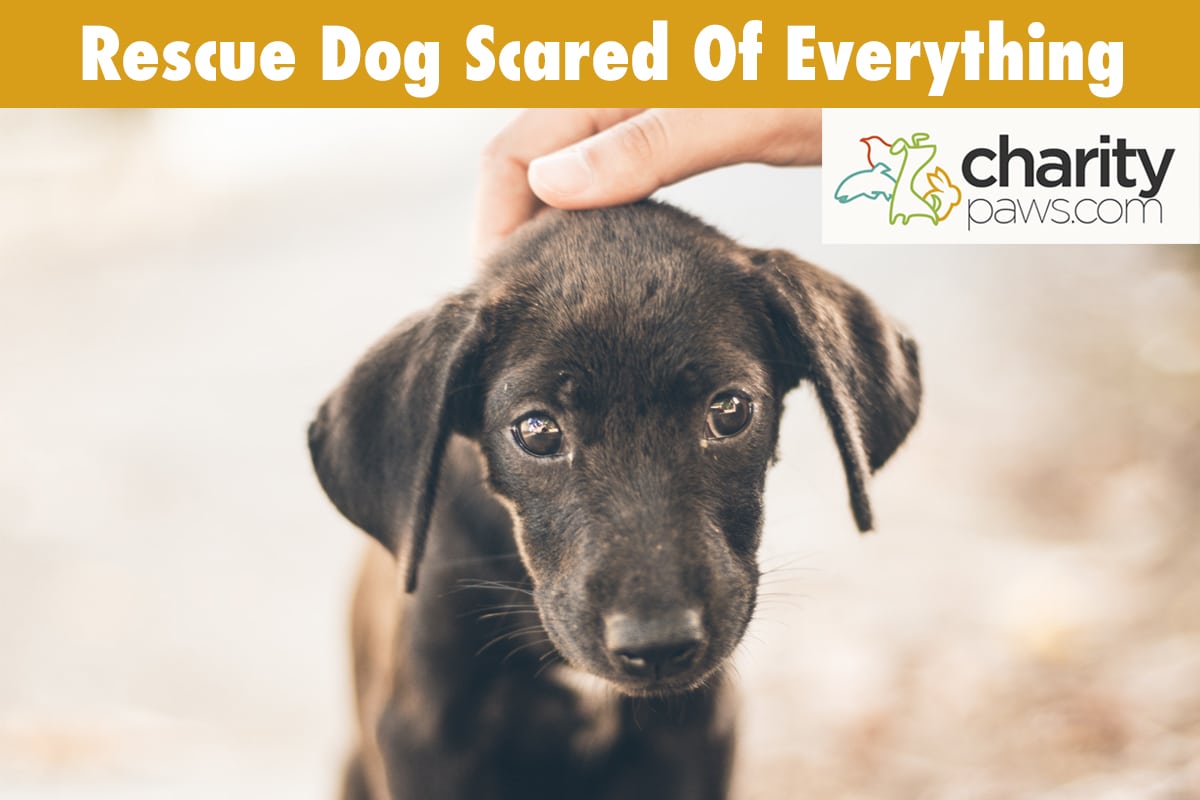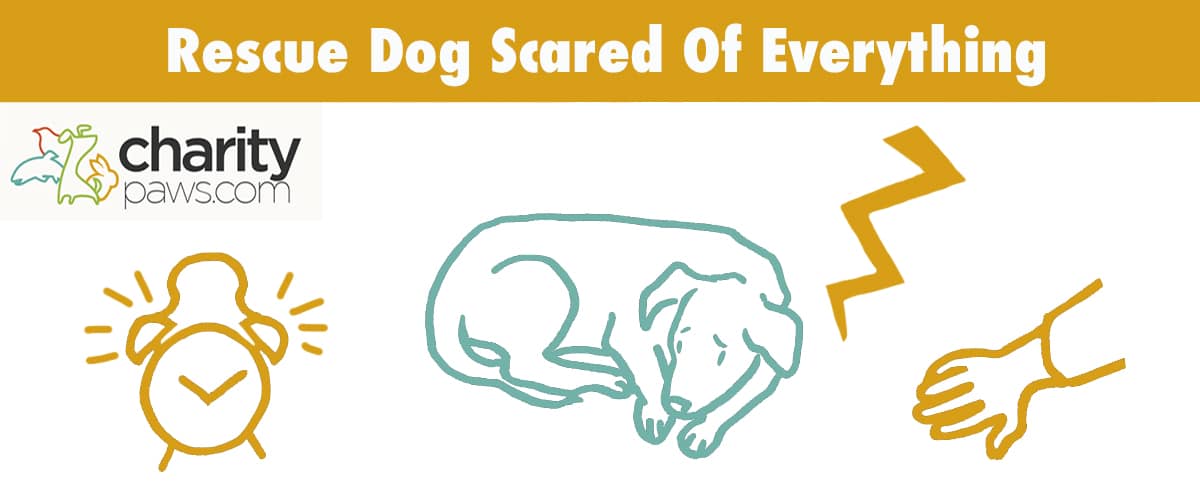More and more people each day are realizing just how wonderful of a companion a rescue dog can be.
Dog lovers around the world are adopting dogs rather than purchasing them, giving loving homes to so many deserving pups.
Though rescue dogs can be the loyal furry friend you are looking for, many will come with baggage as a result of their previously unstable life.
Many of these pups will struggle with fear and anxiety about the world around them, making it more challenging for them to adjust to their new life.
Because of this, many dog parents will need some guidance in helping their timid rescue pup.
In this article we will introduce you to the possible reasons why your rescue dog is scared of everything, and offer you some tips on how to help your timid rescue dog adjust.

Why Is My Rescue Dog Scared Of Everything?
Before we discuss the many ways that you can help your fearful rescue dog, it’s important to first try to understand your new furry friend.
Looking at the world through your rescue dog’s eyes is essential in helping them move forward, as this will help you approach their situation with care.
While every rescue dog has their own story, many of them have one struggle in common; an unstable past.
Each of them are in a rescue or shelter setting as a result of changes they were forced to endure, many of which can lead to underlying fear and anxiety.
Many of these pups have had the rug pulled out from under them, so you can only imagine how much this would impact them going forward.
Want To Save A Rescue?
Find Your Rescue DogYour timid rescue dog has no idea if your home is actually their forever home, so you can imagine just how hard it would be to let your guard down and relax.
The combination of an ever changing environment and influx of new faces would make any pup fearful, so it’s important to be as patient and understanding as possible.
When Will My Rescue Dog Warm Up To Me?
If you have a fearful rescue dog in your home, you may be wondering if they will ever warm up to you.
Having a rescue dog that is scared of everything can be challenging, so many want to know that there is a light at the end of the tunnel.
In order to understand the standard timeline for some pups, we need to break down the 3-3-3 rule of a rescue dog.
Professionals that work in the shelter and rescue field state that you must always account for the 3-3-3 rule in timid rescue dogs.
This rule claims that it takes 3 days for a dog to stop being terrified of their new home, 3 weeks to finally let their guard down and feel comfortable in their new space, and 3 months for their true personality to blossom.
With this in mind, you can begin to understand why it takes some dogs months to completely let their guard down and embrace their full personality.
Adapting to a new home and family is overwhelming for any dog, especially one that is burdened with fear and anxiety.
If you are the lucky owner of a rescued canine friend, you should always be prepared to embrace the 3-3-3 timeline.
10 Tips On How To Help A Scared Rescue Dog
If you have made the decision to adopt a timid rescue pup, you are likely already dedicated to helping them succeed!
Every fearful canine friend is different, but let’s discuss a few of the most effective ways to help a scared rescue dog adjust.
Learn About Their Past
While this may not always be possible, we highly suggest attempting to learn as much about your rescue dog’s past as possible.
This can not only help you better understand what your pup has been through, but it can offer you more insight on their current fears or triggers.
If anything, this can help you approach their struggles with understanding and love.
You can attempt to learn about your dog’s past by speaking with any staff or volunteers that have been involved in your new dog’s care.
They may have information about where your dog was found, if they were surrendered, and the reasons why they were surrendered if so.
Offer Them Patience And Understanding
No matter your rescue dog’s past, you will always want to offer them as much patience and understanding as possible.
Your pup will need to feel comfortable as they adjust to their new life, and as we mentioned above, this can take a few months.
Your scared dog will need to feel supported along the way, and this can only happen if they are allowed to explore their new life at their own pace.
Patience and understanding for your new dog is key throughout this process, as you never know how much help your timid pup will need.
Give Them Space As They Adjust
Now that you are aware of the 3-3-3 rule in your new rescue dog, you can begin to understand why giving them space is so important.
It can take up to 3 weeks for a newly adopted dog to feel comfortable in their new home, and they can only explore comfortably if they are given the space to do so.
Interacting with too many faces or other pets can make this process challenging, and may even cause your pup to retreat even more.
This is one of the reasons why many dog rescues will ask about your life at home as well as if there other animals or children in the home.
You can certainly make sure your rescue dog knows you are there for them by speaking to them softly and offering them treats.
Try to offer them adequate space as they move from room to room and experience to experience.
As time goes on, you may notice that your rescue dog becomes so clingy, which is another issue you will have to work through.
Do Not Force Your Love On Them
Just as we mentioned above, your timid rescue dog will need space as they adjust to their new family and home.
We know how excited you are to have a new canine friend in your life, but you will want to refrain from any forced interactions or cuddles until your pup is coming to you on their own.
Forcing your love on a fearful rescue dog may cause them to shy away even more, as too much forced contact can make them feel anxious.
Forcing any interactions can even be dangerous for both you and your pup, as they may snap or bite as a result of fear.
You don’t want to set your pup back in their progress, so it’s always best to wait for your rescue dog to come to you on their own.
Once this happens, you can offer all the cuddles they desire.
Be Mindful Of Their Body Language
You don’t have to be a canine expert to understand your rescue dog’s body language.
Though we can’t read our furry friend’s mind, we can certainly look at their body for a clue into how they are feeling.
For example, a fearful rescue dog may tuck their tail under, they may pin their ears back, they may tremble, they may whine, and they may even growl if they are feeling overwhelmed.
If your dog is displaying any signs of fear or anxiety, it’s important to give them space and refrain from any forced interactions.
Once your dog knows they will not be forced into any stressful situations, they will begin to let their guard down and interact with you on their own.
This will take varying amounts of time for each pup, so you will need to practice patience based on your dog’s needs.
Offer As Much Positive Reinforcement As Possible
Entering a new home and being around new people can be very scary for a shy rescue dog.
Offering positive reinforcement for every accomplishment can not only help your dog feel supported in their new home, but it can also help them build confidence along the way.
Positive reinforcement can include everything from:
- Gentle praise
- Treats
- Back rubs/belly rubs
- Any other reward your rescue dog enjoys
Be sure to reward as many wins as possible no matter how small they seem, as this will really help to boost your pup’s confidence.
Just be sure to set any treats or toys on the ground if your dog is not yet comfortable with taking them from your hand.
Taking treats or toys out of your hand can be intimidating at first, and you don’t want your pup to miss out on any well-deserved rewards.
Avoid Any Stressful Experiences
Adjusting to a new environment is stressful enough, so you will want to avoid as much unnecessary stress as possible.
This can include meeting too many new people at once, immediate introductions to new animals, interactions with small children, and any other situations that could cause additional anxiety.
If possible, we always suggest waiting at least 2-3 weeks before introducing your pup to any unnecessary people or animals.
Not only will this help your canine friend adjust to their new life at their own pace, but it can also allow you to get to know your new furry friend a bit more.
In this time period, you may catch on to behavioral issues that need to be addressed first.
Basic Obedience Training
Once your scared rescue dog has warmed up to you and their new home, it is helpful to implement some basic obedience training.
This can not only help you bond with your new pup, but basic obedience can offer your dog a much needed confidence boost.
Basic obedience for a new rescue dog can include commands such as sit, lay down, stay, come, and any other tricks you think your pup would enjoy learning.
Keep Track Of Any Fears That Can Be Worked On
As we get to know our newly adopted dogs, many of their fears or triggers will become obvious as the weeks pass.
While these fears will need to be addressed at some point, you do not always have to address them the moment they enter your home.
It is typically best to allow your dog to adapt to their new home before addressing any major fears, as this will offer your pup a foundation of trust to build on down the line.
For example, if it seems like your dog is afraid of other dogs, but you do not have any other pets in your home, this can be a fear that you work on once your pup has settled into their new life.
Once they fully trust you and have a secure foundation to build from, you can begin to conquer any fears that stand in their way of a full life.
Hire A Professional When Needed
Some rescue dogs will endure previous traumas that lead to complicated behavioral struggles.
When this occurs, we cannot always tackle these issues on our own.
Some pups will need the help of a trained professional, especially if any of these behaviors put other people or animals at risk.
If your newly adopted dog struggles with behavioral complications that are over your head, we always suggest seeking professional help.
Will My Rescue Dog Always Be Afraid Of Everything?

Some scared pups will always be a bit timid, but your rescued dog should come out of their shell when you implement the steps we discussed above.
Many scared dogs have made complete transformations when placed in a loving home, as their family’s support allowed them to grow at their own pace.
Though we can never guarantee that your scared rescue dog will conquer all their fears, they should certainly blossom into a loving canine friend with you at their side.
Final Thoughts On Scared Rescue Dogs
Some rescued canine friends can be a bit complicated, but it does not mean they are any less deserving of love.
As long as you offer your scared pup an abundance of patience and love, they will soon begin to conquer their fears one by one.
Your understanding during this time will lead to an unbreakable bond with your dog in the future.

